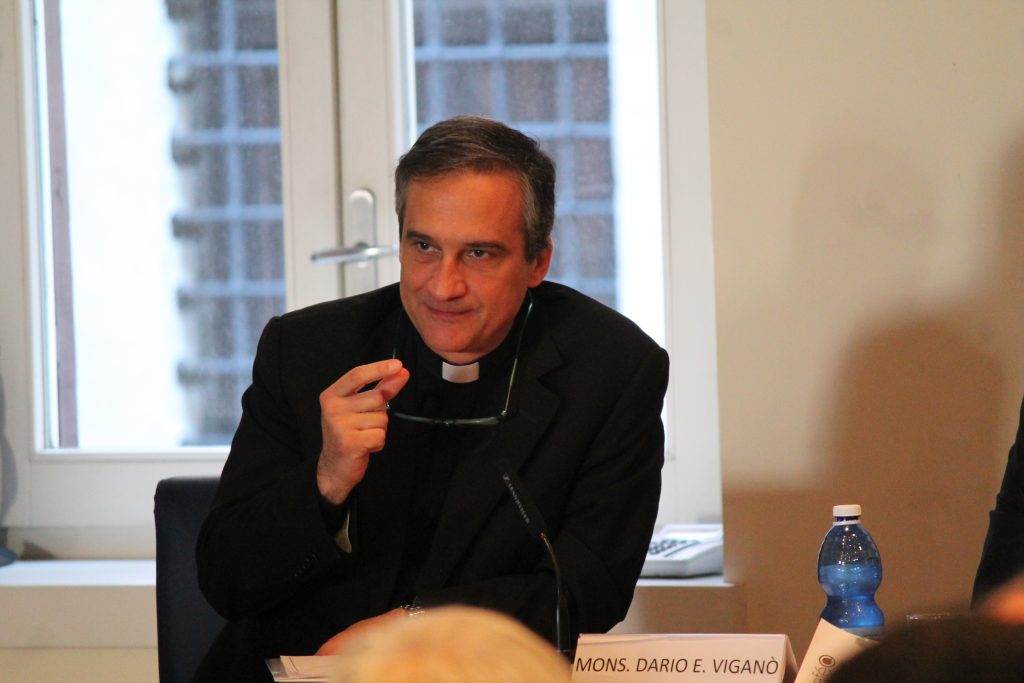In the aftermath of Msgr. Dario Edoardo Viganò’s resignation as prefect of the Secretariat for Communication, rumors in Rome have begun circulating that Vigano’s former deputy, Msgr. Lucio Adrian Ruiz, will be appointed in his place.
Msgr. Ruiz has been the interim prefect of the dicastery since Pope Francis accepted Msgr. Viganò’s resignation March 20, following the so-called “Lettergate” scandal.
Born in 1965 and ordained priest in 1990, Msgr. Ruiz worked in pastoral ministry in Argentina before becoming the assessor for information technology in the General Secretariat of the Argentine bishops’ conference.
A computer analyst who studied at the National University of the Littoral in Argentina, he was also executive secretary to the systems office of the Latin American bishops’ conference (CELAM) and technical coordinator of the Information Technology Network of the Latin American Church.
Before being involved in the Vatican media reform and appointed number two at the Secretariat for Communication, he was responsible for the Internet services of the Vatican City State.
Ruiz was brought onto the leadership team at the Secretariat because of his technical knowledge. He is known as a strong supporter of the Vatican communications reforms championed by Viganò.
When Pope Francis accepted Msgr. Viganò’s letter of resignation, he asked the former prefect to stay on at the dicastery as an assessor, or consultant, in order to give “professional and human contribution” to a new prefect in carrying forward “the project of reform desired by the Council of Cardinals,” which the pope said he “approved and shared.”
In the same letter, Pope Francis stressed that a reform process “is now in the final stage, with the imminent merger of the L’Osservatore Romano within the one communications system of the Holy See, and the absorption of the Vatican Typography [into the same].”
The new prefect will be charged with carrying forward the pope’s reboot of Vatican communications offices. He is likely to be someone able to provide continuity to the substance of the reform process.
In light of the circumstances of Viganò’s departure, many are looking to see if a new appointment will symbolize a change in the way reforms are carried out.
Msgr. Ruiz certainly provides continuity. He has been responsible, however, for most of the “hands on” work of reform and so he cannot be counted on to bring a change of method. Because Ruiz has been Viganò’s subordinate, the former prefect would continue to have serious influence if Ruiz were appointed Viganò’s successor.
In both form and substance, sources have said, a Ruiz appointment would be more of the same.
Until Monday morning, all the smart money was on the current Adjunct Secretary of the Pontifical Council for Culture, Bishop Paul Tighe, who served for many years as the Secretary of the Pontifical Council for Social Communication and was a member of both the committee and the subsequent commission the Pope appointed to study and begin to implement a reform of Vatican media.
Bishop Tighe had a private audience with the Pope on March 15, just as the Lettergate scandal was really exploding.
Bishop Tighe was scheduled for another audience with Pope Francis March 26. That meeting did not take place. A source with knowledge of the matter told CNA that Bishop Tighe’s scheduled March 26 audience with Pope Francis had in fact been cancelled at the end of the last week.
In the meantime, sources report that Ruiz’ candidacy to the post of prefect has become stronger.
If Msgr. Ruiz were really appointed to the post, it would seem to signal that nothing has changed, and that — despite Msgr. Viganò’s resignation — things will stay as such in the Vatican media.
In the end, his appointment could be perceived as only an internal reshuffle, and suggest that the Vatican might view “Lettergate” only as a miscommunication.
However, nothing has been decided yet. It is possible Pope Francis will wait until after Easter to evaluate all the possible choices, and make one that guarantees substantial continuity, while also allowing a measure of change to the manner in which the reform is conducted in its crucial final stage.

